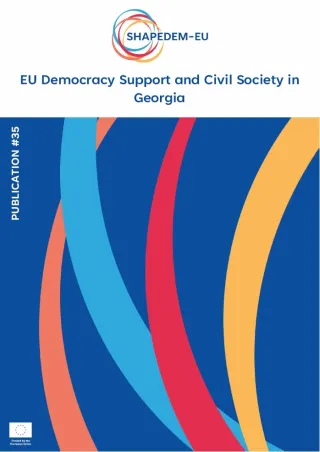Titolo completo
EU Democracy Support and Civil Society in Georgia
The paper critically examines the European Union’s (EU) democracy support practices in Georgia, focusing on the role of civil society within the country’s European integration process. Against the backdrop of pivotal turning points between 2022 and 2025—including the granting of EU candidate status, the government’s authoritarian turn, and the eruption of mass youth-led protests, the analysis explores how EU engagement has both shaped and been challenged by Georgia’s evolving political landscape. Drawing on the framework of social embeddedness, empowerment and accountability, the study assesses whether the EU’s support for civil society has genuinely reinforced democratic values or instead reproduced top-down, technocratic governance models. Findings indicate that EU support has disproportionately targeted established, donor-dependent civil society organisations (CSOs), often sidelining grassroots movements and failing to reflect local democratic knowledge. Institutions such as the Georgian National Platform, intended to institutionalise civic participation, have become elitist and in some cases complicit in legitimising government-led democratic backsliding. The EU’s decision to grant candidate status despite Georgia’s failure to meet most conditions revealed the erosion of conditionality as a key democracy promotion tool, emboldening authoritarian practices and weakening civil society’s watchdog role. By contrast, the nationwide protests of 2024–2025, driven largely by youth and independent activists, demonstrated the emergence of a new civic force outside traditional CSOs structures. These movements highlight both the shortcomings of EU strategies and the need for epistemic unlearning of entrenched donor-centric approaches. The paper concludes that meaningful EU support for democracy in Georgia requires shifting from technocratic partnerships with established NGOs toward engagement with dynamic, grassroots actors capable of sustaining democratic accountability and resilience.
Abstract
Introduction
1 Analytical Framework and Research Questions
2 EU Civil Society Support in Georgia: An Overview
3 EaP Civil Society Forum: A Case of the Georgian National Platform
Conclusions
Bibliography
List of interviews


